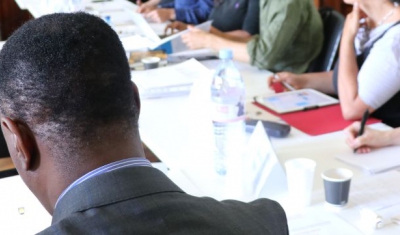The International Human Rights Standards and System: Monitoring and Implementation Strategies at the National Level


CCPR centre
The implementation of internationally agreed human rights standards in national contexts requires the participation of the United Nations (UN) human rights system as well as rigorous monitoring and implementation strategies by national human rights actors.
This training course will delve into the means and mechanisms through which national actors can best coordinate their human rights monitoring and implementation efforts, enabling them to strategically navigate the UN human rights system and use the various mechanisms available in their day-to-day work.
The UN human rights system – composed of UN special procedures, fact-finding missions, UN treaty bodies and the Universal Periodic Review – forms an extensive structure to review state compliance with international human rights standards. This sophisticated architecture at the international level finds complementarity at the national level with the participation of numerous actors: governments, independent state institutions, parliaments, civil society groups and UN agencies among others. More recently, we have also seen the emergence of national human rights structures such as inter-ministerial committees, national mechanisms for implementation, reporting and follow-up, national human rights institutions and national civil society coalitions. These bodies attempt, individually or through collaborative efforts, to ensure state compliance and accountability to the recommendations emanating from the UN human rights system.
Using concrete examples, this training course will provide an overview of the UN human rights system and explore available strategies for national-level implementation of international human rights recommendations, including the many challenges that such work encounters.
In Geneva and Online
The course can be followed in Geneva or online.
Programme
The course will cover the following issues:
- Explain the structure and mechanisms of the international human rights system (including the UN treaty bodies; UN special procedures and fact-finding mechanism and the Universal Periodic Review (UPR)
- Locate the UN Human Rights system within the UN, including the links with related topics and issues such as the Sustainable Development Goals (SDGs) and climate-related goals and conference commitments
- Explain the significance of recommendations that emerge from the UN human rights system
- Explore the obstacles that explain the considerable gap that exists between these recommendations and implementation on the ground in order to hold states accountable for their commitments to international human rights instruments
- Provide examples of good practices that exist, through national structures across the world, to hold governments and third parties accountable to human rights commitments (including national human rights action plans, national mechanisms for implementation, reporting and follow-up, inter-ministerial committees, national civil society coalitions for the UPR and digital human rights tracking tools)
- Visit a UN treaty body session to understand the significance of follow-up mechanisms.
Objectives
At the end of this course, participants will be:
- Understand the UN human rights standards and mechanisms that form the UN human rights system
- Understand how to access international human rights bodies to promote local and national human rights issues
- Develop a detailed understanding of the existing follow-up mechanisms by UN treaty bodies, UN special procedures and fact-finding missions and through the UPR
- Understand the progress made at the national level, through the formation of national collaborative structures, to hold governments and third parties accountable to international human rights commitments
- Demonstrate how collaborative structures can be created at the national level
- Develop an understanding of how such collaborative structures can be used, at the national level in order to close the gaps that exist between human rights recommendations made by the international human rights system and the implementation of these recommendations on the ground.
Methodology
The course will be conducted in a participatory mode with a combination of illustrated lectures (using power points and short videos) and group exercises aimed at understanding how best to access the UN human rights system. These group exercises will also demonstrate how to engage national-level actors, including through strategies to track the implementation of recommendations emanating from the UN human rights system and how to report back to this system to enhance accountability.
Access to a Dedicated Community Platform
All participants in our training course have access – ahead, during and following their course – to a dedicated community platform (on Mighty Network). This community brings together all the participants to our courses who have unlimited access to the training materials and resources shared during their course and can exchange with all the alumni of the Geneva Human Rights Platform Training Hub.
Lecturers
The training course will be led by Miloon Kothari, a renowned expert on human rights and social policy, with extensive teaching and training experience on the UN human rights system.
Audience
This training course is designed for staff of NGOs, research institutes, UN agencies (especially members with experience in fieldwork) and other national and international organisations, members of NHRIs and representatives of governments and academia.
The language of instruction during the training is English. All candidates must possess a level of proficiency in English that enables them to actively participate in the training.
Certification
Participants who successfully complete the training course receive a certificate of participation from the Geneva Academy.
Fee
Attendance in Geneva
The training fee for this five-day programme is 1,830 Swiss Francs and includes tuition costs, course materials, 5 lunches, and refreshments during coffee breaks.
All participants are responsible for their own travel costs to Geneva, including Swiss visa fees and evening meals (approximately 30 Swiss Francs per meal).
Discount for Online Attendance*
The training fee for those attending the course online is 1,550 Swiss Francs.
Discount for PhD and Master Students*
There is a 30 percent discount for PhD and master students.
Payment
The fee is payable as soon as your place has been confirmed. As places on the training course are limited, participation can only be secured through the payment of the fee. In case of cancellation by the participant, CHF 200 won't be returned.
* These two discounts cannot be combined.
How to Apply
Applications must be submitted via this online application form.
Admission decisions for our training courses are made by our experienced lead trainers. They carefully evaluate each application and may offer acceptance, conditional acceptance, placement on a waiting list, or, in some cases, may need to decline the application.
If you have questions, do not hesitate to contact us: traininghub[at]geneva-academy.ch













